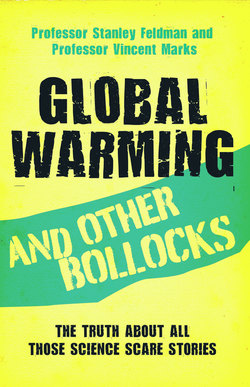Читать книгу Global Warming and Other Bollocks - Stanley Feldman - Страница 6
На сайте Литреса книга снята с продажи.
FOREWORD
ОглавлениеThe philosophies of one age have become the absurdities of the next, and the foolishness of yesterday becomes the wisdom of tomorrow.
—Sir William Osler, Aequanimitas and other addresses
SEVERAL YEARS AGO we were told that all the computer systems would fail at the turn of the millennium. Millions of pounds were spent on the so-called ‘millennium bug’. It proved to be nonsense.
The panic caused by public concern over the toxicity of DDT and the prediction it would lead to a sterile sea and famine on Earth caused its use to be suspended. As a result, millions have died of malaria and insect-borne diseases.
The health authorities told us that we should avoid cholesterol, or else our arteries would clog up and we would die young from heart disease. Eat only one egg a week, drink only skimmed milk and consume no cream or butter. Millions of pounds were spent on low-cholesterol diets. We now know it is a waste of time: it is not the cholesterol one eats that causes heart disease.
We are told our children are getting so fat that they will die younger than their parents. It is nonsense. We are being scared stiff.
Following two relatively dry years in 2004–05, we were told by government officials that, because of global warming, we should get used to droughts and obtaining our water from standpipes in the streets, that we should rip out our flowering shrubs and replant with drought-loving plants. So successful was this propaganda that the Chelsea Flower Show in 2007 featured grasses and succulents. It was followed by a series of the wettest summers on record, with sodden gardens and floods.
Today our children’s school meals are subject to the ‘food police’, who inspect their sandwiches, control their lunches and lecture them on their parents’ bad eating habits and the dangers of junk food. They ban fizzy drinks and stop the children using salt. They are taken on ‘school trips’ to the depots to be indoctrinated on the virtues of recycling, shown propaganda films to scare them stiff about the dangers of global warming and told they must walk to school and stop their parents using the car and destroying the Earth. They are not allowed to expose themselves when the sun shines in case they get melanoma, they must avoid foods that contain chemicals and weigh themselves regularly to make sure they are not part of the obesity epidemic that will kill them before they reach maturity.
With such a busy schedule, lessons on reading and arithmetic take second place in the curriculum. This might possibly be justified if the message they are being given was likely to improve their wellbeing and prevent future disease. The trouble is that there is increasing evidence that it is, like the ‘millennium bug’, a belief that is in part or entirely untrue. Often it is based on numbers picked out of the air.
We are frequently presented with new scare stories, based on so-called ‘new research’, often involving epidemiological surveys, poor science or inadequate samples. They soon become belief systems. They are propagated by the prophets of doom in a manner that engenders irrational fear. They foretell of imminent disaster unless remedial action is taken. The scare develops into a belief, like a religious dogma, whose tenets invariably end up involving a restriction of personal choice and freedom of action. This, they claim, is the price to pay to assuage the wrath of nature and the inevitable disaster presaged by these New Age prophets of doom.
The problem is that not all scare stories are baseless or involve poor science. Smoking is undoubtedly bad for your health. The beneficial effect of stopping smoking is real and important. The smoking scare was based on good evidence that met the criteria of ‘reasonable proof’. Similarly, we have reason to be circumspect about the effect of a burgeoning population on finite or limited resources and to be prepared to meet the challenge of any possible natural disaster or epidemic. It needs good evidence from reproducible scientific observation to determine the degree of risk associated with a particular indulgence. Only when this evidence is watertight and compelling is it justifiable to restrict personal freedom and individual choice.
The various chapters in this book analyse some of the beliefs and opinions that are the basis of the constraints that have been imposed on the way we live. In some cases, our analysis justifies the measures that have been taken. In most cases, they challenge the accepted dogmas that have led to the limitations that have been imposed on our freedom. The particular views presented reflect the opinions of the authors. Their views are personal and are iconoclastic. They are not necessarily shared to the same extent by all the contributors or the editors. They are intended to make the reader stop, enquire and think again about what he or she believes to be an accepted fact.
